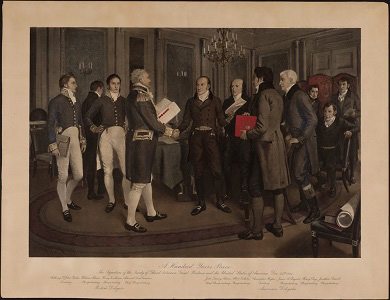After nearly three years of war, Britain and the U.S. were ready to make peace. Both countries sent their delegates to Ghent, where they battled over demands. In the end, they signed a treaty that accomplished little and ended a war that decided even less.

Library and Archives Canada
Even as the war raged on the northern border of the U.S. and a British army sailed toward the U.S. capital city, American and British negotiators had assembled in the Belgian city of Ghent. They began negotiations in August 1814. Both delegations had received instructions from their governments along with a list of demands.
The American delegation’s primary concerns were those reasons that they went to war. They sought the end of impressment, a defense of the rights of neutral trade, and restoration of the boundaries that existed before the war.
The British took a strong stance on their maritime rights, sought the creation of a “large Indian zone” to serve as a buffer between the countries, and remained concerned about U.S. expansion in North America.
Over the course of five months, the two delegations battled back and forth over each demand. The British became less fervent about maritime rights on paper, as long as they were upheld in practice. The Americans, on the other hand, recognized that Britain was no longer impressing sailors into the Royal Navy, and so dropped their demand about impressment.
A shadow hung over the negotiations because neither government wanted to continue the war. When it became clear that a deal was close, the meetings became more secretive so that no one could disturb the talks.
On December 24, 1814, both delegations signed the Treaty of Ghent. The final agreement mentioned very few of the major concerns that each side had brought to the table. One important clause insisted that the treaty must be ratified without alteration, which ensured a quick path to peace. In the meantime, the war continued.
Unfortunately, the delay in getting the treaty from Europe to North America to ratify meant that the treaty did not reach the U.S. in time to save British lives at the Battle of New Orleans. On January 8, 1815, the American army won their most complete victory over the British. Heavy British casualties were seemingly for naught.
In June 1812, Congress declared war while a compromise traveled from England. The war had begun and ended in ways defined by the communication speed of the Age of Sail.
Last updated: May 24, 2016
